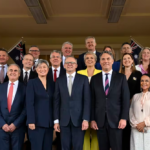Australians are no climate dinosaurs
A majority of Australians now accept that climate change is occurring. Kristina Stefanova from the Climate Institute shares the results of this year’s Climate of the Nation report.
Since 2007, The Climate Institute has produced the Climate of the Nation report taking the Australian public’s pulse on climate change, its impacts and solutions. The research has shown the ebb and flow of opinions as the nation has weathered the physical impacts of climate change (droughts, floods, fires) and the fallout of an ongoing and fierce political debate. We found that 2012 – on the eve of the introduction of the carbon laws – was the low point across a range of public attitude indicators on climate change.
This year’s research finds that a much stronger majority of Australians accept that climate change is occurring: 70% today, up 6 points from 2012. Only 13% disagree, a drop of 4%. Most of those who agree that climate change is occurring say that this is at least partly caused by humans (84%).
Many Australians are concerned that a range of potentially wide-reaching consequences, economic and environmental, may affect the way we live. Almost two-thirds (64%) agree that ignoring climate change is simply not an answer, as it increases the risk of the situation getting worse.
Australians believe that the federal government shoulders the greatest responsibility for leading a response to climate change but that it’s doing a poor job. Trust is particularly low for the Prime Minister: only 20% agree that they trust Tony Abbott when he says he is concerned about addressing climate change, while 53% disagree. Opposition Leader Bill Shorten fares only slightly better: 31% say that they trust Shorten when he says he is concerned about climate change; 32% disagree.
One of the most significant evolutions in views over the last couple of years has been in Australians’ desire for the nation to be a leader in climate change solutions. That’s at 61% this year, a level not seen in 2008, and on the up for the second consecutive year. Ambition for Australia’s 2020 emissions reduction target is up too: 46% now believe that an emissions reduction target of 5% by 2020 is too low (up 14 points since 2012). Only 8% think it’s too high (down from 17% in 2012).
A majority (56%) agree that Australia should participate in a new international agreement like the Kyoto Protocol to reduce global emissions.
When it comes to solutions to climate change, Climate of the Nation 2014 finds that for the first time, more Australians support the carbon pricing laws (34%) than oppose them (30%).
Almost half of Australians (47%) think that carbon pricing is a better solution than taking no action, up 5 points from 2013 and 8 points from 2012. Almost as many (44%) say that carbon pricing should be given a chance to work for at least a few years.
More Australians prefer to keep it over replacing it with the government’s proposed “Direct Action” policy (26% vs 20%) but a majority couldn’t decide between the two options. Only 22% think that “Direct Action” is a credible policy.
This polling confirms previous research which found that the government really has no mandate to repeal carbon pricing. It follows an exit poll on Election Day, which found that the election was not a “referendum on the carbon tax”, with the issue relegated below many others.
Today only a third of Australians (34%) support repeal, down 14 points from 2012. Disagreement with the proposition that carbon pricing should be repealed is at 27%, virtually unchanged.
Renewable energy is the solution for which there is resilient, strong support. Solar, wind and hydro have topped the charts as ideal energy options for three years now. Coal, nuclear and gas continue to be least supported.
Despite the fragmenting of previously bipartisan support for renewable energy and growing attacks from fossil fuel-based energy utilities, a substantial majority of Australians (76%) agree that “state governments should be putting in place incentives for more renewable energy such as wind farms.” Only 10% disagree.
Most want the Renewable Energy Target (RET) to be more ambitious, rather than weakened as the government has suggested. Some 29% want to see the RET increased to 30% or above, 31% agree to keep the RET as is at 20-30% and 11% would like to see the target set at exactly 20%. Only 4% wanted a decrease in the RET, while 5% want it scrapped altogether.
*This year’s research is based on a nationally representative online poll of 1,145 Australians over the age of 18, conducted 16-20 May, by JWS Research.
Kristina Stefanova is Communications Director of the Climate Institute.














Allan Catlin
June 29, 2014 at 10:26 am
climate change
This is a timely reminder for the government to adopt a real policy instead of this 'direct action', which means what? We must do something and we must do it now. More people now see the writing on the wall. I would like to see more money spent on science, not less. There may be other solutions out there that have not been discovered yet, and science will find them if allowed. In the meantime couldn't we as a nation, supported by our government, put more solar panels on domestic and commercial rooftops, build more windfarms, do more research on geothermal energy, use less fossil fuels both privately and commercially and so on. While we are learning how to halt the change, let's slow down human damage.
frank6th
July 7, 2014 at 4:02 pm
Good science
I hate to bring this up but just because 'x' number of people believe in something it does not make it so… Ask those that use to think the earth was flat! Good science is based on evidence and fact. Unfortunately I have studied the global warming trends and the carbon dioxide trends and I find a better coralation with solar activity. So I have a small amount of skepticism in me, but I do agree the earth is warming, our fossil fuel burning pollution is non reversible and we are burning up all the best fossil fuels like there is no tomorrow and they are starting to run out or get harder to mine. The responsible thing to do is not to let the first to find a resource plunder it, it belongs to all of us! On the same note we place no value on fossil fuels except what it costs to dig them up, to me this is wrong… Are they not worth at least what it is going to cost to make a replacement once we have used up that resource? I know there are countries we compete with to sell resources that will under cut us if we put proper prices on our resources but does that mean we should be giving them away just to make a quick buck… It's all very sort sighted this fossil fuel resource topic. But one thing I do know is that renewable energy sources won't depleat the next generations air or fossil fuels.